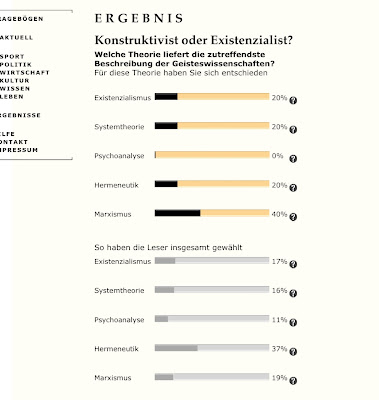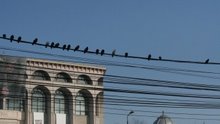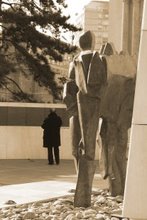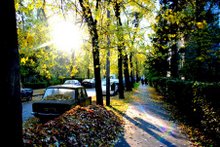Thursday 29 March 2007
The Little Sunbeam
I had asked to interview his parents about their ‘traditional produce’ initiative. They led me into a chilly ‘best room’ and said, there is a problem with the other room, because their little son had a problem with his legs and this is why a teacher came everyday to give him lessons at home. He would have to have this plaster on both legs for about one and a half years, because there was a major problem with his bones. At the level of both his feet, the plaster was attached to a kind of wooden stick of about 70 cm. False diagnoses had caused that this had not been remedied when he was a toddler. I asked what he was doing with his time. They told me: watching TV, reading a bit, playing with his brother and with friends that come to visit. So later on it got too cold in the first room, and the teacher had finished for the day, so I got to meet this child. He was an energy bundle, very loveable, and apparently very happy. He asked to see the world map to determine where Britain was, and Luxie and thought it was very far away. He asked how I had come, with the plane or with the boat. His next question was whether I had read the paper in the plane. He was a bit disappointed to hear that I usually sleep in planes (yes, some kind of narcolepsy confined to pressure cabins, and, more generally, but less reliably so, public transport of various kinds). He wanted to know how many engines the plane had and whether I had paid for the petrol. He asked me what I was doing here anyway, and I attempted to explain. And then he made my heart melt, saying: ‘How do you say Alexandru in Luxembourgish?’
The Ending of Regimes
I finally dared asking the question about the ending of regimes. When did it first occur to you that communism might not be forever? To me, it is a hard question. It was answered to me in the following way by someone I appreciate a lot:
‘Summer of 1989. My father was saying that Ceausescu’s regime was not going to last past the year. I didn’t know. I realised that things were happening in Berlin. Then we had a meeting of the UTC (Union of Young Communists) at work. It was a regular thing, an ideology meeting, a kind of advanced course. One guy was speaking and I was sleeping with my eyes open. I must have been one of the older people there, I was around thirty. Something he said woke me up, and I reacted to it. He said that only with Communism, History had come, before Communism there had been no History. I said f*%& that, what on earth do you mean? I was astonished that no one else reacted, but they were either not listening, like me, or they were a lot younger. What happened then was even stranger. He made his excuses and left in the middle of the course. I was expecting to get into trouble by the security, but I did not. I started to believe my father was right.’
1989 was a long time ago. I was nine years old. I remember the Berlin pictures on TV, the classrooms I was in that year, and I remember my communion. It was so stressful the day ended with a headache (possibly brought on by the impossibly tight weave the hairdresser had created on the top of my head), the ice-cream lamb was crying, and it was cold and beautifully bright outside. Last weekend someone (male, around 35, married, one child, wealthy) was visiting who wore a communist emblem T-Shirt under his white jumper. You know the kind, red background, white hammer and sickle. Strange choice despite the period that has passed…
‘Summer of 1989. My father was saying that Ceausescu’s regime was not going to last past the year. I didn’t know. I realised that things were happening in Berlin. Then we had a meeting of the UTC (Union of Young Communists) at work. It was a regular thing, an ideology meeting, a kind of advanced course. One guy was speaking and I was sleeping with my eyes open. I must have been one of the older people there, I was around thirty. Something he said woke me up, and I reacted to it. He said that only with Communism, History had come, before Communism there had been no History. I said f*%& that, what on earth do you mean? I was astonished that no one else reacted, but they were either not listening, like me, or they were a lot younger. What happened then was even stranger. He made his excuses and left in the middle of the course. I was expecting to get into trouble by the security, but I did not. I started to believe my father was right.’
1989 was a long time ago. I was nine years old. I remember the Berlin pictures on TV, the classrooms I was in that year, and I remember my communion. It was so stressful the day ended with a headache (possibly brought on by the impossibly tight weave the hairdresser had created on the top of my head), the ice-cream lamb was crying, and it was cold and beautifully bright outside. Last weekend someone (male, around 35, married, one child, wealthy) was visiting who wore a communist emblem T-Shirt under his white jumper. You know the kind, red background, white hammer and sickle. Strange choice despite the period that has passed…
And think not...

...that you can direct the course of love, for love, if it finds you worthy, directs your course.
(Kahlil Gibran, The Prophet)
How does this statement correlate, firstly, with a certain existing, dominant understanding of self-made, individual-driven realisations of the modern, separate, rational self, and, secondly, with ideas of self as carried by forces, impinged upon by all kinds of wonders and disasters? Two disclaimers/premises. A. Allow me to caricature. B. Presuming one has a certain amount of choice to start with, dependent from location, economic and social status, sex, age, etc.
The question: is it more desirable, easy, comfortable, ‘good’, morally convincing to see one’s self as a closed container with thoughts, emotions and a past, striding on a path he (I am choosing this pronoun here as the archetype of male modernity, if I may…) has chosen, rationally, with premeditation, with amassed former knowledge?
Ensuing questions which still mesmerise me: What makes this so? Who decides this? In whose interest is it? What are the problems with this conception?
How does he include other people in his choices? How does he include irrationality in his choices? How can he deal with unconscious desire, fear and complex proclivities? How does he get involved with people if he does not let them into his being? If we take this further, how does he subsist if he does not get involved, a social being raised by others, educated by others, influenced by others, helped by others all the way to the present and into the future?
Note that I am very unknowledgeable about psychoanalysis (see below the result of a test I took a while ago with ZEIT online), but willing to be educated about it…
24.03.07
(Kahlil Gibran, The Prophet)
How does this statement correlate, firstly, with a certain existing, dominant understanding of self-made, individual-driven realisations of the modern, separate, rational self, and, secondly, with ideas of self as carried by forces, impinged upon by all kinds of wonders and disasters? Two disclaimers/premises. A. Allow me to caricature. B. Presuming one has a certain amount of choice to start with, dependent from location, economic and social status, sex, age, etc.
The question: is it more desirable, easy, comfortable, ‘good’, morally convincing to see one’s self as a closed container with thoughts, emotions and a past, striding on a path he (I am choosing this pronoun here as the archetype of male modernity, if I may…) has chosen, rationally, with premeditation, with amassed former knowledge?
Ensuing questions which still mesmerise me: What makes this so? Who decides this? In whose interest is it? What are the problems with this conception?
How does he include other people in his choices? How does he include irrationality in his choices? How can he deal with unconscious desire, fear and complex proclivities? How does he get involved with people if he does not let them into his being? If we take this further, how does he subsist if he does not get involved, a social being raised by others, educated by others, influenced by others, helped by others all the way to the present and into the future?
Note that I am very unknowledgeable about psychoanalysis (see below the result of a test I took a while ago with ZEIT online), but willing to be educated about it…
24.03.07
Poverty and Precariousness
Someone pointed out to me that poor people on the countryside fare better than people in the city. The comment precipitated a lot of thought on the matter, because part of me at first rejected it entirely (always fascinating to see how we react to certain engrained assumptions qualified). Then I conceded that I had been wrong about certain things in this regard.
Not only two or three people here get twenty-five (25) euro pension per month. Some households are constituted of three generations, sharing one salary, and one of the said pensions. I have been wondering about the difference between the poverty here, and the poverty in Western Europe. It may be not just a question of difference in degree, but also a question of difference in kind. I take into account that a difference exists between the kind of poverty found in cities and the one found (here) on the countryside. People here get credit at the local food shop to buy bread (one bread costs 0.7 RON = 0.2 EURO – the shopkeeper explained to me that they had to have a sign saying ‘no credit here’, but that it was not possible to stick to this in practice). The people that have a pension, no matter how minuscule, do not get social benefits, apart from one-off money for fire wood (only heating source around here with very few exceptions). From what I hear from the Lux context, people do get enough money to cover their basic needs. And, speaking about basic needs, I do not think there is anyone in Britain or Lux who does not have access to running water, a bathroom, and electricity. There are a lot of people here who do not have number one and two, and a few who do not have number three. The reason elderly people hold as many animals as they can work is because they cut food bills and enrich staple diets. You can also (at the moment of writing: still) somehow sell the cheese you make, the eggs your chickens lay, and the meat of the spring lamb that your ewe has had. This helps, to some degree. Of course, the facts that communism collapsed and left a whole generation on terribly small pensions (who is to blame that they did not pay contributions to a fund then?), and that incomes are up to ten times lower than in some Western European countries needs to be taken into account in any characterisation of the kind of poverty here.
On the other hand, the kind of misery in Western Europe I mean may resemble the urban kind. It can mean a combination of the following: high debts, forms of social exclusion that include lack of access to education, to secure and fairly-paid jobs, to a secure, healthy living environment, and so forth.
I think one of the most important differences is that in the countryside here, people live without major debts, but in the cities, people have debts because they have commodities, too. In the cities, people may make more plans for the future to face uncertainty, but here, uncertainty is levelled out by minimising the risk in the present, because they do not have the resources to act otherwise. I am not sure how it is with risk deferment: people commit to take out mortgages and pay in health and pension cover, but what kind of percentage can still commit to this kind of responsibility in societies rapidly increasing in inequality, say, in ten or fifteen years’ time? Furthermore, there may be more of temporary poverty because the job situation can change quickly. The welfare state being under siege from various internal and external forces, I am not sure anymore in how far we can and should still speak about it. So these are my embryonic thoughts on the matter, and I am sure a lot has been written about it. I just need to find time to read all that.
Not only two or three people here get twenty-five (25) euro pension per month. Some households are constituted of three generations, sharing one salary, and one of the said pensions. I have been wondering about the difference between the poverty here, and the poverty in Western Europe. It may be not just a question of difference in degree, but also a question of difference in kind. I take into account that a difference exists between the kind of poverty found in cities and the one found (here) on the countryside. People here get credit at the local food shop to buy bread (one bread costs 0.7 RON = 0.2 EURO – the shopkeeper explained to me that they had to have a sign saying ‘no credit here’, but that it was not possible to stick to this in practice). The people that have a pension, no matter how minuscule, do not get social benefits, apart from one-off money for fire wood (only heating source around here with very few exceptions). From what I hear from the Lux context, people do get enough money to cover their basic needs. And, speaking about basic needs, I do not think there is anyone in Britain or Lux who does not have access to running water, a bathroom, and electricity. There are a lot of people here who do not have number one and two, and a few who do not have number three. The reason elderly people hold as many animals as they can work is because they cut food bills and enrich staple diets. You can also (at the moment of writing: still) somehow sell the cheese you make, the eggs your chickens lay, and the meat of the spring lamb that your ewe has had. This helps, to some degree. Of course, the facts that communism collapsed and left a whole generation on terribly small pensions (who is to blame that they did not pay contributions to a fund then?), and that incomes are up to ten times lower than in some Western European countries needs to be taken into account in any characterisation of the kind of poverty here.
On the other hand, the kind of misery in Western Europe I mean may resemble the urban kind. It can mean a combination of the following: high debts, forms of social exclusion that include lack of access to education, to secure and fairly-paid jobs, to a secure, healthy living environment, and so forth.
I think one of the most important differences is that in the countryside here, people live without major debts, but in the cities, people have debts because they have commodities, too. In the cities, people may make more plans for the future to face uncertainty, but here, uncertainty is levelled out by minimising the risk in the present, because they do not have the resources to act otherwise. I am not sure how it is with risk deferment: people commit to take out mortgages and pay in health and pension cover, but what kind of percentage can still commit to this kind of responsibility in societies rapidly increasing in inequality, say, in ten or fifteen years’ time? Furthermore, there may be more of temporary poverty because the job situation can change quickly. The welfare state being under siege from various internal and external forces, I am not sure anymore in how far we can and should still speak about it. So these are my embryonic thoughts on the matter, and I am sure a lot has been written about it. I just need to find time to read all that.
How to get old.
The heaviness of life becomes apparent in the features of a person. Its multiple disappointments, those periods of great distress and business, loss and bereavement, financial burdens, health problems and silenced annoyances and betrayals in often life-spanning relationships shrink eyes, fashion and colour skin, nails, teeth and hair, discipline gaits, and model bones and muscle tissue. More often than not, these shapes are recognised as mere effects of ageing, but their quality depends on a lot more than that. We forget to look at people, at the lines on their face and their hands that trace their steps into maturity and beyond (one haunting line from an admittedly soppy film: ‘I want all this marked on my body…’). We forget to show candour towards the personal tragedies, conflicts and duplicities that potentially rest with every person we meet. Everyday statements I encountered in the last few months make me very thoughtful about the kinds of futures that may be in store for me. They are no extraordinary statements, only striking in their commonness. You may know of people who, on the face of it, have had much harder lives, more spectacular fates, in war zones, dictatorships or areas of ecological disaster, for instance. I would argue, however, the scale of sadness, desperation, courage, and moral stance it takes to keep struggling cannot be judged by any Human.
My son is drinking, his wife left him; as a consequence I lost touch with my grandchild, as she emigrated with her mother to Spain. After I had my two girls, I got twins, one of which had a severe disability, and my husband did not assist me in raising the children. My husband died when I was 21, I am 94 and have lost everyone I knew and cared for in the course of time. My wife was taken from me aged only 56, in the space of a few weeks, and has left me with two old women and two children to support. My wife is dying of Alzheimer’s, I take care of her, the house, the animals, the children. My former partner made love to a girl when I was pregnant with his child. My husband comes home late, and I know it is not business that is keeping him, but other women. I am nearing 40 and I have no family, and am too set in my bachelor ways to hope to change. I have had 5 miscarriages, and my only child died of pneumonia. I realised when my partner had a heart attack that I have been depending on him too much, and how will I feed my children if he dies now.
When I look at pictures of me taken recently, I start to see the heaviness. Either it was not there before I left, or I did not know how to read it. Everyone is worried about getting old, but it depends on how you get old. I am including concerns about one’s desirability in relation to others here (and maybe this point is more valid for women), but I am intuitively considering this issue as somewhat tangential, and, possibly, engendered by pure personal refusal, without enough substantial backup. This how to get old, of course, means taking what you get from life with a dose of stoicism and base-happiness in the face of opposition, self-irony, a sense of proportion of one’s own importance or lack thereof, and, on the other hand, struggle, struggle, struggle, to get what you seriously want from life. Cutting away all the pieces of arrogance, inflated senses of self, self-torture, and all kinds of other reasons that make us choose what we do, I believe we can attempt to begin to see ourselves for what we are, and not distorted with all kinds of obsessions, quests for perfection and killing-ourselves-to-fulfil desires resulting from complex forces résultantes of the past. I, for one, was not made for being the lone anthropologist. Being outside of the ties of stability, of family, of friends is shaping my being in slow and painful ways. It makes me long for a family of my own, despite the risks, despite the fallbacks, despite everything. My desires are among the most banal, among the most common, as you realise. What makes us desire this kind of thing in the full knowledge of the drawbacks, I ask you. Normalisation? Truly the best possible thing? Egotism? Altruism? The grass is greener on the other side? What is it that makes us keep our faith in people, and our medium-to-high expectations, having encountered stupidity, recklessness, inconsideration, weakness, domination, abuse and cowardice? Is it true that the kind of person who wishes to subsist on their own, and who finds this desirable, is becoming more common? Why? Why not? Or am I missing the point altogether and this is about something else entirely? I beg you to exclude any strict neo-Darwinian and Foucauldian takes in your responses, for I will refuse to publish them ;-).
24.03.07
My son is drinking, his wife left him; as a consequence I lost touch with my grandchild, as she emigrated with her mother to Spain. After I had my two girls, I got twins, one of which had a severe disability, and my husband did not assist me in raising the children. My husband died when I was 21, I am 94 and have lost everyone I knew and cared for in the course of time. My wife was taken from me aged only 56, in the space of a few weeks, and has left me with two old women and two children to support. My wife is dying of Alzheimer’s, I take care of her, the house, the animals, the children. My former partner made love to a girl when I was pregnant with his child. My husband comes home late, and I know it is not business that is keeping him, but other women. I am nearing 40 and I have no family, and am too set in my bachelor ways to hope to change. I have had 5 miscarriages, and my only child died of pneumonia. I realised when my partner had a heart attack that I have been depending on him too much, and how will I feed my children if he dies now.
When I look at pictures of me taken recently, I start to see the heaviness. Either it was not there before I left, or I did not know how to read it. Everyone is worried about getting old, but it depends on how you get old. I am including concerns about one’s desirability in relation to others here (and maybe this point is more valid for women), but I am intuitively considering this issue as somewhat tangential, and, possibly, engendered by pure personal refusal, without enough substantial backup. This how to get old, of course, means taking what you get from life with a dose of stoicism and base-happiness in the face of opposition, self-irony, a sense of proportion of one’s own importance or lack thereof, and, on the other hand, struggle, struggle, struggle, to get what you seriously want from life. Cutting away all the pieces of arrogance, inflated senses of self, self-torture, and all kinds of other reasons that make us choose what we do, I believe we can attempt to begin to see ourselves for what we are, and not distorted with all kinds of obsessions, quests for perfection and killing-ourselves-to-fulfil desires resulting from complex forces résultantes of the past. I, for one, was not made for being the lone anthropologist. Being outside of the ties of stability, of family, of friends is shaping my being in slow and painful ways. It makes me long for a family of my own, despite the risks, despite the fallbacks, despite everything. My desires are among the most banal, among the most common, as you realise. What makes us desire this kind of thing in the full knowledge of the drawbacks, I ask you. Normalisation? Truly the best possible thing? Egotism? Altruism? The grass is greener on the other side? What is it that makes us keep our faith in people, and our medium-to-high expectations, having encountered stupidity, recklessness, inconsideration, weakness, domination, abuse and cowardice? Is it true that the kind of person who wishes to subsist on their own, and who finds this desirable, is becoming more common? Why? Why not? Or am I missing the point altogether and this is about something else entirely? I beg you to exclude any strict neo-Darwinian and Foucauldian takes in your responses, for I will refuse to publish them ;-).
24.03.07
Tuesday 13 March 2007
tonight
Tonight my life doesn’t make a whole lot of sense. I am on my own in a country that I often fail to understand, with people who do not share my way of being, my way of feeling, and my aims and aspirations. The politics here are crazy, we are moving from one political crisis to the next. The spin of the moment is whether the European elections will be postponed. The spin of tomorrow is yet another deal with personal interests and business interests uncannily close and extremely dangerous. Becali, the richissime owner of Steaua Bucharest, leads the Party of the New Generation, without a programme, but the slogan that ‘politics is his salvation’ and a weird compulsion to talk about idealism, honesty, thieves (all other parties) and that he wants to build a right-wing oriental Christian democratic kind of politics. My true worry is that he might become Romania’s next president. People in the village take it stoically. They know regimes come and go and they are all bad, in one way or another. People are involved in very hierarchical relationships of dependence and services and yet, I am not sure whether community is the right word to use. All this and more makes me tired, prone to colds and, sometimes, grumpy and extremely vulnerable to whatever comes (or doesn’t come) my way. I miss my friends and I miss having a life that is filled with things I love doing: exercising in the gym, playing badminton, going to the library, having a regulated, tightly scheduled life, going to the cinema, going to the pub with people I share more than just location with. I am eaten by fleas and spiders and the people I want to spend time with for fun are the same who I hurt in their manly pride by telling them that I am not in the least attracted to them. The selection is not vast I must say, and those that do not consider me worth ignoring regard me as a child. I am not taken seriously, because people work in different ways here and do not hold appointments and delay, delay, delay, and then do not have any time left. It makes me feel like I am not achieving a lot. The child-woman lacks everything at times to defend herself in a manner that will not be considered impolite or reckless or un-womanly. I try to be a good anthropologist, but I do not know if even come close. I exhaust myself on one day, manically wandering through the village and being filled up with other people’s lives, and feel so elated I could eat the world, then follow three days of rain, of rejection, of ‘I have no idea what to tell you’, and of ‘this week I really don’t have time for this, maybe in the autumn’ (my hosts’ response to this was, ‘yes, but they didn’t say which autumn’), of broken promises and a ruptured tire to round it off. I do wonder at the methods we anthropologists use, and at all the time wasted to get just a bit of information, all these hours spent hanging about in pubs (unwomanly), in gardens with busy women, on the street just to get a bit of ‘data’. I suppose most research is like this, and how naïve I have been to write all the things about activist research, and similar patronising things.
Labels:
experiential,
nutshell-alarmed,
politics,
research
tonight
Tonight my life doesn’t make a whole lot of sense. I am on my own in a country that I often fail to understand, with people who do not share my way of being, my way of feeling, and my aims and aspirations. The politics here are crazy, we are moving from one political crisis to the next. The spin of the moment is whether the European elections will be postponed. The spin of tomorrow is yet another deal with personal interests and business interests uncannily close and extremely dangerous. Becali, the richissime owner of Steaua Bucharest, leads the Party of the New Generation, without a programme, but the slogan that ‘politics is his salvation’ and a weird compulsion to talk about idealism, honesty, thieves (all other parties) and that he wants to build a right-wing oriental Christian democratic kind of politics. My true worry is that he might become Romania’s next president. People in the village take it stoically. They know regimes come and go and they are all bad, in one way or another. People are involved in very hierarchical relationships of dependence and services and yet, I am not sure whether community is the right word to use. All this and more makes me tired, prone to colds and, sometimes, grumpy and extremely vulnerable to whatever comes (or doesn’t come) my way. I miss my friends and I miss having a life that is filled with things I love doing: exercising in the gym, playing badminton, going to the library, having a regulated, tightly scheduled life, going to the cinema, going to the pub with people I share more than just location with. I am eaten by fleas and spiders and the people I want to spend time with for fun are the same who I hurt in their manly pride by telling them that I am not in the least attracted to them. The selection is not vast I must say, and those that do not consider me worth ignoring regard me as a child. I am not taken seriously, because people work in different ways here and do not hold appointments and delay, delay, delay, and then do not have any time left. It makes me feel like I am not achieving a lot. The child-woman lacks everything at times to defend herself in a manner that will not be considered impolite or reckless or un-womanly. I try to be a good anthropologist, but I do not know if even come close. I exhaust myself on one day, manically wandering through the village and being filled up with other people’s lives, and feel so elated I could eat the world, then follow three days of rain, of rejection, of ‘I have no idea what to tell you’, and of ‘this week I really don’t have time for this, maybe in the autumn’ (my hosts’ response to this was, ‘yes, but they didn’t say which autumn’), of broken promises and a ruptured tire to round it off. I do wonder at the methods we anthropologists use, and at all the time wasted to get just a bit of information, all these hours spent hanging about in pubs (unwomanly), in gardens with busy women, on the street just to get a bit of ‘data’. I suppose most research is like this, and how naïve I have been to write all the things about activist research, and similar patronising things.
Labels:
experiential,
nutshell-alarmed,
politics,
research
are you speakin’ my language?
The allusion to the song with the vegemite song I come from the land Down Under is intentional. Before I will acquaint you with the wonders of Romanian, this is an appeal to pity the anthropologist, deprived of food she loves, and send her a jar of that disgustingly salty marmite. I have had cravings for weeks now, not at the stage of dreaming of it just yet (like Pele did of meat in India), but getting close...
Romanian had me fooled, looking and sounding a lot like a Latin language. I am still struggling with speaking it, possibly because it creates interference with languages I am familiar with. The grammar is partially in line with Latin, having a vocative case, as well as genitive and dative inflexions, and accusative case is also marked. So it is a synthetic language in some grammatical features. In others, it is something altogether different. There are a lot of formulations that inverse the whole idea of subject-owning-action, and would be literally translated as 'to me is', e.g. to me is hunger, to me is longing. In terms of agency (I know it is a term used excessively in British social science) it has all kinds of fascinating repercussions. Another maddening thing is that the syntactical constructions often require the double expression of the direct or indirect object. This means that the nouns or their substitutes carrying the lexcial meaning are duplicated by a so-called 'unstressed' form of the personal pronoun in the accusative or dative, which acts as a kind of early warning system for the actual pronoun. I think it is very stressful indeed though. As far as I understand this feature is necessary because the word order is relatively free, due to the inflexions carried by the cases, but it appears a redundant feature nevertheless, in a lot of examples. Then again, me not liking it will not make it go away. Romanian is the only Romance language that has kept the neuter from Latin, but which now presents a nice levelling mechanism, by which the neuter noun takes a masculine modifier in the singular and a feminine one in the plural.
As far as vocabulary is concerned, Romanian presents borrowings from what is popularly called 'Dacian' (e.g. brânză – cheese, and vărză - cabbage). The substratum then used to be Dacian and the superstratum Slavic (Bulgarian, Russian, Serb..., e.g. sfat, sfaturi – advice, val, valuri - wave). In the course of time Turkish (e.g. geam, geamuri - window glass; one more great word is neskedil, denoting a person with an embroidered heart), Germanic (aparat, aparate), French (fenomen, fenomene), Hungarian (pahar, pahare - glass), Greek (scop, scopuri - goal) borrowings happened. Due to nineteenth century nationalist efforts, 'intellectuals' latinised the language, reacting against the Slavic elements in it. What you read in the papers (or on the internet on Romanian-language BBC) is a lot more Latin-based than the thing they actually speak here, much to my frustration at times. I suppose the situation, historically, is somewhat (broadly) comparable to how, in the British Isles, words of Germanic origin were paralleled with Norman French words, and reflected a sharp social rank differentiation.
As a continuation of my love for words, their sounds and usage, here are some of my Romanian favourites. I like the word a ciufuli (pronounced with an Italian sonority of the letter c as tʃ in front of i), meaning to dishevel. Also a great word a toarce, which means both to spin and to purr. See here for speculations on possible origins of a dezmierda, meaning 'to caress'.
A great pair of words, used in all kinds of specific senses would correspond to the French se débrouiller and its opposite s'embrouiller, in English to manage in a resourceful way: a se descurca, also with the literal meaning of disentangle (much nicer than 'to get on top of things'). It is also used for a crafty person who knows how to use the 'system' for her own ends, and who is well-networked. The opposite a se încurca means to tangle, to trouble, to flummox, to confuse, to puzzle, to encumber. I find the image of the tangle very appropriate to describe both the way in which we create relationships in the world and the way in which we navigate in labyrinths that never fully reveal themselves. As we âdisentangle ourselves from one thing, we are already getting caught up in the next one. And no, I am not talking about Geertz's / Weber's 'webs of significance'.
Teaching and learning, on the other hand, means a preda and a învața, and, for some obscure reason I keep confusing them. Embarrassing when you want to use one, and accidentally say 'I want to teach how it works', when actually you have no idea, and want to learn how it works. Being an anthropologist away from home means to continually fall prey to moments of shame, awkward silence, and bad grammar.
Last week at some point I had obviously cracked a magnificent joke as my host burst into a laugh so loud it made the walls shake. My problem was that I was an innocent comedian, not having grasped what I had said. It turned out to be something about a maimuță (monkey) – I had gotten the word wrong from the start, and have been mistakenly calling monkeys for a while now muță, and I was quite puzzled as to why something should be 'more monkey' than something else... hard to explain out of context, but made me happy to see her happy.
Romanian had me fooled, looking and sounding a lot like a Latin language. I am still struggling with speaking it, possibly because it creates interference with languages I am familiar with. The grammar is partially in line with Latin, having a vocative case, as well as genitive and dative inflexions, and accusative case is also marked. So it is a synthetic language in some grammatical features. In others, it is something altogether different. There are a lot of formulations that inverse the whole idea of subject-owning-action, and would be literally translated as 'to me is', e.g. to me is hunger, to me is longing. In terms of agency (I know it is a term used excessively in British social science) it has all kinds of fascinating repercussions. Another maddening thing is that the syntactical constructions often require the double expression of the direct or indirect object. This means that the nouns or their substitutes carrying the lexcial meaning are duplicated by a so-called 'unstressed' form of the personal pronoun in the accusative or dative, which acts as a kind of early warning system for the actual pronoun. I think it is very stressful indeed though. As far as I understand this feature is necessary because the word order is relatively free, due to the inflexions carried by the cases, but it appears a redundant feature nevertheless, in a lot of examples. Then again, me not liking it will not make it go away. Romanian is the only Romance language that has kept the neuter from Latin, but which now presents a nice levelling mechanism, by which the neuter noun takes a masculine modifier in the singular and a feminine one in the plural.
As far as vocabulary is concerned, Romanian presents borrowings from what is popularly called 'Dacian' (e.g. brânză – cheese, and vărză - cabbage). The substratum then used to be Dacian and the superstratum Slavic (Bulgarian, Russian, Serb..., e.g. sfat, sfaturi – advice, val, valuri - wave). In the course of time Turkish (e.g. geam, geamuri - window glass; one more great word is neskedil, denoting a person with an embroidered heart), Germanic (aparat, aparate), French (fenomen, fenomene), Hungarian (pahar, pahare - glass), Greek (scop, scopuri - goal) borrowings happened. Due to nineteenth century nationalist efforts, 'intellectuals' latinised the language, reacting against the Slavic elements in it. What you read in the papers (or on the internet on Romanian-language BBC) is a lot more Latin-based than the thing they actually speak here, much to my frustration at times. I suppose the situation, historically, is somewhat (broadly) comparable to how, in the British Isles, words of Germanic origin were paralleled with Norman French words, and reflected a sharp social rank differentiation.
As a continuation of my love for words, their sounds and usage, here are some of my Romanian favourites. I like the word a ciufuli (pronounced with an Italian sonority of the letter c as tʃ in front of i), meaning to dishevel. Also a great word a toarce, which means both to spin and to purr. See here for speculations on possible origins of a dezmierda, meaning 'to caress'.
A great pair of words, used in all kinds of specific senses would correspond to the French se débrouiller and its opposite s'embrouiller, in English to manage in a resourceful way: a se descurca, also with the literal meaning of disentangle (much nicer than 'to get on top of things'). It is also used for a crafty person who knows how to use the 'system' for her own ends, and who is well-networked. The opposite a se încurca means to tangle, to trouble, to flummox, to confuse, to puzzle, to encumber. I find the image of the tangle very appropriate to describe both the way in which we create relationships in the world and the way in which we navigate in labyrinths that never fully reveal themselves. As we âdisentangle ourselves from one thing, we are already getting caught up in the next one. And no, I am not talking about Geertz's / Weber's 'webs of significance'.
Teaching and learning, on the other hand, means a preda and a învața, and, for some obscure reason I keep confusing them. Embarrassing when you want to use one, and accidentally say 'I want to teach how it works', when actually you have no idea, and want to learn how it works. Being an anthropologist away from home means to continually fall prey to moments of shame, awkward silence, and bad grammar.
Last week at some point I had obviously cracked a magnificent joke as my host burst into a laugh so loud it made the walls shake. My problem was that I was an innocent comedian, not having grasped what I had said. It turned out to be something about a maimuță (monkey) – I had gotten the word wrong from the start, and have been mistakenly calling monkeys for a while now muță, and I was quite puzzled as to why something should be 'more monkey' than something else... hard to explain out of context, but made me happy to see her happy.
Labels:
knowledge,
language,
nutshell-laughs,
nutshell-meanderings
Subscribe to:
Posts (Atom)






